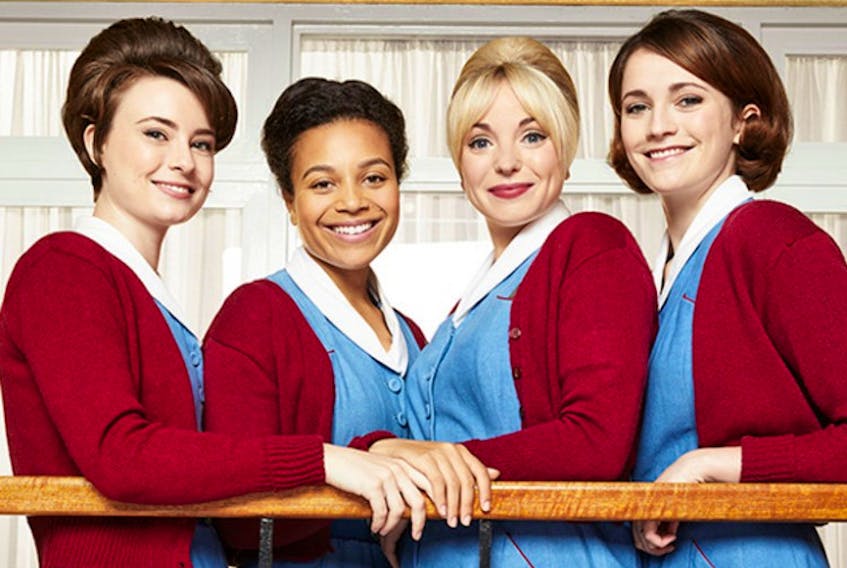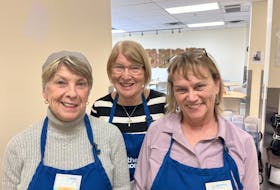There are certain things that bring comfort and coziness to the fore, especially on nights when a northeasterly wind is blowing hard against the house. A hot cup of tea, a blanket, maybe even something that’s been freshly baked.
To top it off, a new episode of “Call the Midwife.”

The British series is back on PBS this spring with its eighth season, and the melodic strings of its theme are a familiar sound in our home: a call to the couch, as it were.
I’m a fan of “Call the Midwife,” and not just because it’s a show that makes me want to snuggle under my blanket and sip some tea.
Yes, the show has a soft and warm feeling, its characters sometimes unrealistically kindhearted, but there’s a backbone of steel — and quite a lot of nerve — under that fleecy exterior.
“Call the Midwife” is based on the memoir of the same name and other writings by Jennifer Worth, about her years working as a midwife in the poverty-stricken Poplar neighbourhood of east London, starting in the 1950s. Worth, trained as a nurse and midwife, worked with a religious order of nuns, then serving the area.
The television adaptation started in 1957, and it’s now up to 1964. The show brilliantly documents social change, and not just in the obvious ways, such as clothing and hairstyles.
Episode in, episode out, “Call the Midwife” has been carefully documenting women’s health and experience in mid-century Britain — and many issues beyond. The show does not pull its punches, either. Neglect, rape, genital mutilation, alcoholism: they have all provided fodder for powerful storylines. The inextricable and sometimes tragic links between poverty, inadequate housing and public health are common themes.
The show has also been documenting what we’ve known — and didn’t yet know — in medicine. An episode this season was about sickle cell anemia, which at the time was scarcely understood. Earlier story arcs looked at polio, thalidomide, post partum depression, and the lack of services for and knowledge about people with disabilities.
A continuing theme this season is illegal abortion, and the dire consequences for the women who sought it. While it’s a bright and sunny 1964 in the show , its tone brings a dark era in women’s health to the light. It will be another three years before the British parliament passes the Abortion Act.
It’s a clever mix: a narrative that doesn’t blink in its choice of topics, but serves it with compassion and humanity.
In one gripping episode, a young mother is overwhelmed with anxiety knowing she is again pregnant. To outsiders, her world seems safe and secure: loving partner, growing children. But to her, the unexpected pregnancy brings extraordinary stress, and when the kind doctor featured on the show turns her down, she gambles with an illegal abortionist who works in the shadows. It’s a gamble she pays with her life.
Jennifer Worth — who died of cancer in 2011, and never got to see herself portrayed by Jessica Raine in the first three seasons of “Call the Midwife” — was a fierce critic of romanticized treatments of illegal abortion, including the Mike Leigh movie Vera Drake. She said in her time working in London, she never saw a woman survive such methods.
The show carries that spirit, and is not afraid to show clearly the pain and horror that come with few options and illegal procedures. Those born in later years may be shocked to see the gritty reality of a no-choice environment.
There are so many other lessons, too, about change. I was struck by a scene in one episode involving a medical examination. A woman is finally seen by a specialist, but the examination happens in a brightly lit room, surrounded by a group of men in medical training. The specialist speaks to his students, not to the patient, and in cold, clinical language.
It’s a disturbing moment.
And yet the show is warm, filled with kindness and love. It’s a clever mix: a narrative that doesn’t blink in its choice of topics, but serves it with compassion and humanity.
Martha Muzychka is a writer and consultant based in St. John’s. Email: [email protected].
MORE FROM MARTHA MUZYCHKA









